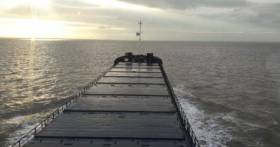Displaying items by tag: AB Ports
#ports - A leading UK ports operator, Associated British Ports (ABP) recently announced an additional investment to boost facilities at its Port of Hull, bringing the group’s total investment to £250 million since the EU referendum in 2016.
This programme of investment demonstrates the group’s commitment to keeping Britain trading with Europe and the rest of the world after Brexit.
ABP is actively working to support businesses anxious about the event of a No-Deal Brexit and the potential severe disruption this may cause at the Port of Dover.
Container and ferry facilities at ABP on the Humber are capable of helping businesses bypass such disruption, providing regular and reliable links to Europe. Over 70 sailings every week connect the Humber to a number of destinations including Belgium, the Netherlands, Denmark and Poland.
Investment highlights include: £50 million to boost capacity at its container terminals at ABP’s ports of Hull and Immingham; £65 million to help ensure the future of the steel industry on the river Humber; £55 million to enhance the automotive and cruise offering in the Port of Southampton. In addition to a range of other investments throughout its network of 21 ports across England, Scotland and Wales.
According to ABP which has an important component role in the UK’s trading infrastructure, the group handles almost £150 billion of UK trade across its port network, contributing around £7.5 billion to the UK economy. In addition to supporting almost 120,000 jobs across its supply chains.
Record Breaking Year At Irish Sea Port of Silloth
#ports - According to Associated British Ports (ABP) which operates the Port of Silloth on the Irish Sea, has celebrated a record-breaking year in 2018 by handling the highest cargo volumes since 2015.
This year the north-west English port handled a total of around 156,000 tonnes of cargo, representing nearly a 20% growth in tonnage volumes since 2017.
In addition, in December, the vessel ‘Blue Six’ (pictured above) carried more than 3,700 tonnes of French wheat became the fifth largest delivery to enter the port since official records began in the 19th century. The wheat was processed at Carr’s Flour Mill, a thriving business and important local employer, founded more than 180 years ago.
The top spot for Silloth’s largest cargo delivery is still held by the ‘Arklow Venture’ (see launch) which transported over 4,200 tonnes of bulk fertiliser from Antwerp to Silloth in March 2014.
Carl Bevan, ABP Divisional Port Manager – North West, said: “We are pleased to report that the Port of Silloth has had an excellent year, handling 58 piloted ships and exceeding expectations thanks to the positive performance of our customers and colleagues.”
“We also opened our new ground-mounted solar farm in May 2018 which allows ABP Port of Silloth to generate more electricity than it consumes with all surplus green electricity being exported to the National Grid.”
























































